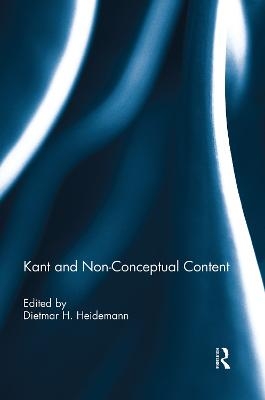
Kant and Non-Conceptual Content
Routledge (Verlag)
978-1-138-94434-3 (ISBN)
Conceptualism is the view that cognizers can have mental representations of the world only if they possess the adequate concepts by means of which they can specify what they represent. By contrast, non-conceptualism is the view that mental representations of the world do not necessarily presuppose concepts by means of which the content of these representations can be specified, thus cognizers can have mental representations of the world that are non-conceptual. Consequently, if conceptualism is true then non-conceptualism must be false, and vice versa. This incompatibility makes the current debate over conceptualism and non-conceptualism a fundamental controversy since the range of conceptual capacities that cognizers have certainly has an impact on their mental representations of the world, on how sense perception is structured, and how external world beliefs are justified.
Conceptualists and non-conceptualists alike refer to Kant as the major authoritative reference point from which they start and develop their arguments. The appeal to Kant attempts to pave the way for a robust answer to the question of whether or not there is non-conceptual content. Since the incompatibility of the conceptualist and non-conceptualist readings of Kant indicate a paradigm case, hopes have risen that the answer to the question of whether Kant is a conceptualist or a non-conceptualist might settle the contemporary controversy across the board. This volume searches for that answer.
This book is based on a special issue of the International Journal of Philosophical Studies.
Dietmar H. Heidemann is Professor of Philosophy at the University of Luxembourg. His area of specialisation is Kant, German Idealism, theory of knowledge and philosophy of mind.
1. Introduction: Kant and Non-conceptual Content: The Origin of the Problem Dietmar H. Heidemann 2. Beyond the Myth of the Myth: A Kantian Theory of Non-Conceptual Content Robert Hanna 3. Kant’s Non-Conceptualism, Rogue Objects, and The Gap in the B Deduction Robert Hanna 4. A Conceptualist Reply to Hanna’s Kantian Non-Conceptualism Brady Bowman 5. Hanna, Kantian Non-Conceptualism, and Benacerraf’s Dilemma Terry F. Godlove, Jr. 6. Is there a Gap in Kant’s B Deduction? Stefanie Grüne 7. Non-Conceptual Content and the Subjectivity of Consciousness Tobias Schlicht 8. Was Kant a nonceptualist? Hannah Ginsborg
| Verlagsort | London |
|---|---|
| Sprache | englisch |
| Maße | 156 x 234 mm |
| Gewicht | 450 g |
| Themenwelt | Geisteswissenschaften ► Philosophie ► Geschichte der Philosophie |
| Geisteswissenschaften ► Philosophie ► Logik | |
| Geisteswissenschaften ► Philosophie ► Philosophie der Neuzeit | |
| ISBN-10 | 1-138-94434-3 / 1138944343 |
| ISBN-13 | 978-1-138-94434-3 / 9781138944343 |
| Zustand | Neuware |
| Haben Sie eine Frage zum Produkt? |
aus dem Bereich


